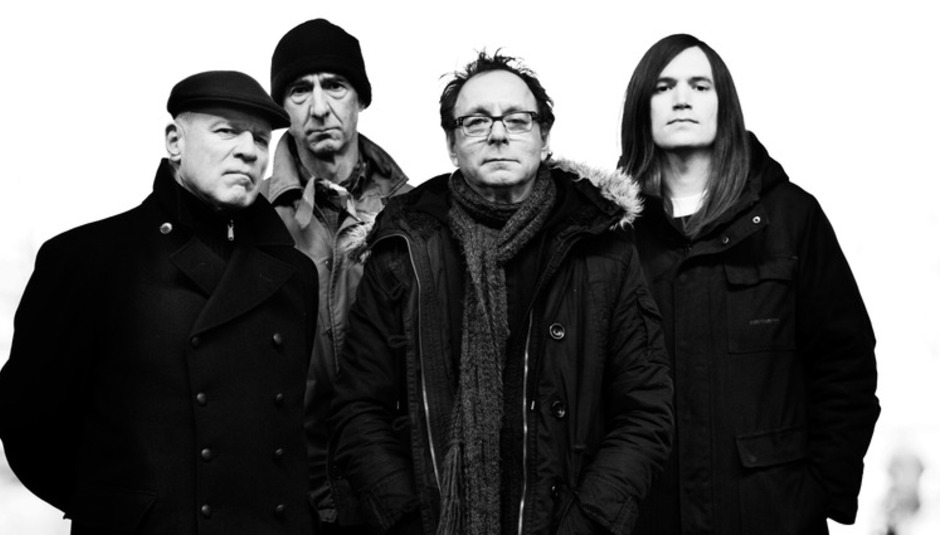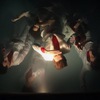“There was a guy in front of me in the queue for the toilets and he was saying to his mate, ‘My dad said I should go and see Wire tonight. They’re some band from the ‘70s’.”
A friend told this story at Beacons Festival in August. Kids today, right? Course, these guys queuing for the bogs know Wire better than they think do. If they’ve never heard ‘Connection’ by Elastica (based on the riff from Wire’s ‘Three Girl Rhumba’) they’ve at least heard “the music from Trigger Happy TV” (which used the Elastica track as its theme tune). More than likely though, they’ve heard the countless bands that Wire have influenced – the ones that eschew the frivolities of rock ‘n’ roll and reconfigure the punk formula to revel in the raw machinery of guitar, bass and drums.
And anyway – “some band from the ‘70s”? Naturally, that’s not how Wire singer/guitarist Colin Newman sees it: “We’re a contemporary band, we always have been.
“The truth of the matter is since the beginning of the last decade we've been trying to figure out how we can make our voice heard, and we come from a very particular point of view. The industry would have us be some kind of revival group, all about the past, and Wire isn’t interested in it. It never has been interested in it and it never will be interested in it.”
This reluctance of Wire to be lumped in with the rest of their lot is nothing new. Shamelessly taking influence from their art school backgrounds, the quartet of Newman, guitarist Bruce Gilbert, bassist Graham Lewis and drummer Robert Grey, which made its live debut in February 1977, saw the punk movement from a sideways perspective. The Sex Pistols might have been set up to destroy rock ‘n’ roll, but even they had guitar solos; Wire crammed 21 tracks into 35 minutes on their debut album Pink Flag, shedding all superfluities to make the most punk music conceivable. Forget post-punk – this was punk because it was defined as much by what it wasn’t, by what it opposed, by what it lacked, rather than by any aggressive attitude, counter-cultural costume or spiky haircut.
Standing in contrast to The Clash, The Damned and the rest, it’s easy to understand why Wire are now often considered the first post-punk band, having rewritten the punk’s rulebook before the Sex Pistols had even packed in. Their second and third albums, Chairs Missing and 154 saw the band take further steps towards the leftfield, before finally taking a step too far by performing a Dadaist cabaret to a hostile punk crowd, as documented on 1981’s Document And Eyewitness live album. This single performance – which featured newspaper headdresses and an illuminated goose, if that’s any indication of what a confused state Wire were in – wasn’t solely to blame, but the band disintegrated soon after.
“’80/‘81 was a challenge to everyone, including good sense,” Newman laughs now, accepting that these days, “I don’t think it’s about challenging [the audience]. We’re just not going to play… For a start Wire have never had any hits, so we can’t play a greatest hits set, because there aren’t any.
“We’ll definitely play songs which were written before this year, although you might not recognise them,” he says, laughing again. But Newman’s true to his word: Wire’s Beacons setlist, for example, features ‘Map Ref. 41°N 93°W’ (1979) and ‘Drill’ (the first song Wire wrote when they reconvened in 1985) alongside material from this year’s fantastic Change Becomes Us.
Newman’s told many a journalist that “Wire don’t do comebacks”, though they’ve had their fair share of absences – first, in the early ‘80s, and then again for most of the ‘90s. When they returned in 1999 it was, according to Newman, “on the cusp of when post-punk suddenly became, a) Recognised as a genre, and b) Extremely influential with a bunch of bands from Brooklyn,” and the band haven’t really looked back since. Change Becomes Us was their third album in five years. Newman’s take? “I think we're definitely on a roll.
“I’m always a bit nervous of the word ‘career’ – I'll let you know when it starts,” he jokes. “I feel that we're probably in a better place than we have been, like ever, you know? I mean, obviously, we were strong in the ‘70s but we were obscure in the ‘70s as well. The thing was it was a very, very different time. You could be on the front page of the NME and not really on radio at all. We were just talking about this festival [Beacons]… and it’s almost random who's headlining on the stages. Like, are Stealing Sheep bigger than Melody’s Echo Chamber? I have no idea. They’re just on Marc Riley.
“I've got no idea [if we’re bigger now than ever], I think is the answer. The next album, for me, will be a very interesting point to judge it. The last album, Change Becomes Us, you know, phenomenal reviews; album that preceded it, Red Barked Tree, phenomenal reviews. If we do a third album in a row which gets really strong reviews, that people think is a really strong record, I think we'll probably be in a place where no band of our age has ever been.”
Certainly, if you look around for original post-punk bands who are actually still making new music, it’s hard to think of any that can compete with the consistent acclaim for Wire’s recent work. After all, no one went particularly wild for Gang Of Four’s 2011 effort, Content, and although last year’s PiL comeback album was up there with their best, it was one album after a 20 year gap, and it remains to be seen whether Lydon and co. will be able to build on its popularity.
The secret of Wire’s success, arguably, lies in their constant reappraisal of their working practices – for Red Barked Tree, Newman wrote songs on an acoustic guitar without the rest of the band for the first time since the ‘70s, while Change Becomes Us features a wealth of ideas that were originally formed in the late seventies, but which had remained untouched ever since.
Adding guitarist Matt Simms to the line-up will also have had an impact on Change Becomes Us. Although Newman, Lewis and Grey had made two albums without Gilbert, who left in 2004, this was the first time they’d let anyone who didn’t play on Pink Flag become a fully-fledged member of Wire.
“There’s a consistency of attitude within the band,” says Newman. “It got very messy in the ‘80s between us, as is very well documented, but really in the last few years I think everyone’s come to the conclusion that this really is worth doing, and if it’s worth doing you might as well put everything you’ve go into it. Matt may be younger than us but he’s no different to us. We recognised it almost from day one. His attitude is very similar, the way he approaches music is very similar so he just fit right in.”
The contribution of Simms – who also fronts Kent-based psych act It Hugs Back – has been more than musical, having devised a two-tier system for dividing royalties to make sure everyone gets their fair share. Newman admits that the question of who gets what “has been a problem in the past” but Simms is pragmatic about his decision to join a band that’s had its fair share of fallings out.
“I was aware,” he reflects on Wire’s problematic past. “I think all bands, it’s a relationship, and they all have their difficulties with each other but it’s about how you deal with it. There’s a respect for each other, both musically and personally. In terms of recording and playing I’m all for being within a unit and working to make one big thing. Individual mentality doesn’t really come into it so I think that’s kind of why it works.”
What’s clear is that Newman isn’t exaggerating when he talks about the seamlessness with which Simms slotted into Wire. They talk about having a shared “intuition” in the studio and of course, they have a mutual thirst for experimentation that other bands often lack.
“The thing I worry about other bands who are in their 20s and 30s now,” says Newman, “is that they start with that mindset of what I would call ‘pick ‘n’ mix’, where you start a band and you start with a set of influences which you’ve listed out, and if you can do a slightly weird one, that’s always good, but then you become the sum of your influences and it’s impossible to progress beyond that. In a way, the strength of if you have influences – the polite way of saying it – is transcending them. But the more realistic way of saying it is that you actually totally fail to be able to do what it is that you are trying to and in your failure you manage to come up with something which is different.”
MS: “I think there’s a freedom to it all [with Wire], which goes back to what you were saying about bands that have a list of influences. It’s what they lack, isn’t it? They don’t have the confidence to go, ‘Well, this sounds good, we’re gonna do it’.”
CN: “Malka – my wife – and I have been running a label since the early ‘90s. We used to have this post-breakfast demo session. One thing we found, if you discard everything where the first 20 seconds will tell you everything you need to know, is you have a category of people who are able to produce a really strong opening piece, and then the second one is unlistenable. You couldn’t work with them because they don’t know what’s good about what they do.”
Whereas if there’s one thing Wire do know it’s what they do best – even their wildest experiments occur within the parameters that define the band, stripped of all excess. “You’ve got a band with at least two…” Newman turns to Simms. “Are you a minimalist, Matt?”
MS: “I flirt with minimalism.”
CN: “You flirt with minimalism, so we’ve got two-and-a-half minimalists in the band. You’ve got one super-minimalist who’s not me – Rob, if he can get away with hitting one cymbal then that’s him – but I think there is something to be said with keeping it lean, and keeping to the point a bit. I think Wire can be more or less anything but we wouldn’t make a full-on techno record.”
And that’s the key – each Wire album is different, but all are distinctly Wire, and it’s a formula which, after 37 years, finally seems to be paying off. “We are definitely going into areas that we have never been before in terms of the fame and money side of it,” says Newman, which must make up for the sting of those lads at the loos not having a clue who he is. Although it turns out, he’s not overly fussed about whether his band’s influence is universally recognised.
“I think the only thing you can decide to do or try to do is be good, and be as good as you bloody well can,” he explains. “Nobody’s really interested, especially with older bands, in being crap. Why would you be bothering? Why would anyone want to bother to see you or buy your records if you’re just trading on what you did in the past or you’re just trading on the fact that you’ve influenced a bunch of other bands? It doesn’t really translate into anything. It has to be like, ‘I’ve heard of this band, I’ve heard they’ve influenced so-and-so, and then I heard their record or I saw them live and they were really good’. It’s got to be like that rather than, ‘Yeah, I can see how they’ve influenced those other bands but I really like the other band that they’ve influenced’.
“It’s nice to feel that one’s influenced people, but at the same time it’s actually quite nice to have your own audience. ‘Who are they?’ ‘Oh, they’ve influenced Franz Ferdinand.’ Well we don’t sound anything like Franz Ferdinand and haven’t really had much to do with them, so we aren’t like the bands that we’ve influenced. Menswear – I thought they were a band that were made up for doing an ad.”






















